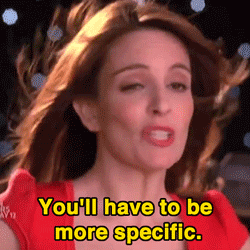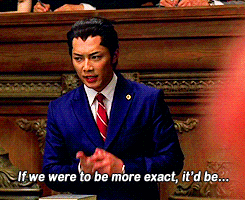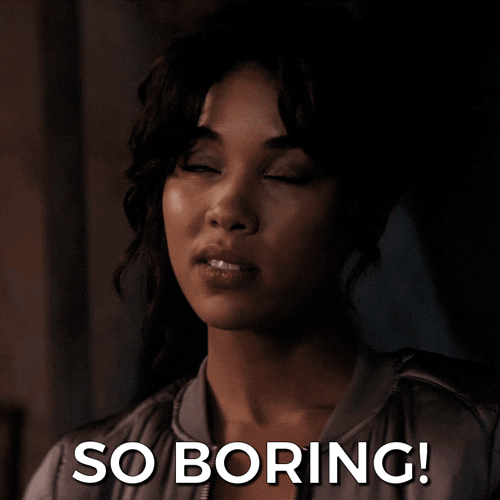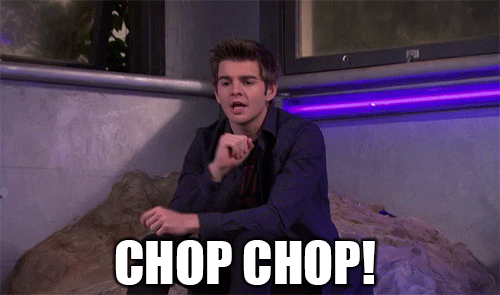Writing classes have their place. Writing workshops have their place. But sometimes ya just need some down-and-dirty tips for a quick fix of that "thank God, I'm progressing a writer" feeling.
Well, have I got you covered!
Let's talk about these pain points and, more important, how to improve them:
"Be" verbs
"There is"/"there was"
Passive voice
Filler words
1. "Be" verbs
You know these guys: am, is, are, was, were, be, being, been. They're basically a big "equals" sign in the sentence.
And just to make our lives harder, this group also includes words that function like "be" verbs, such as "seem," "sound," "look," "appear"... The list goes on. I know this, and I'm sorry.
"Be" verbs aren't inherently evil, but here's the thing: they don't contribute anything to your writing. They describe the subject in the most basic way possible.

Examples of "be" verbs (+ how to fix them)
You can identify any "be" verb by replacing the verb with "equals." If it works, you've got yourself a "be" verb (or a variant).
So how do we fix them?
Find a vivid verb and/or rephrase the sentence.

Example A
Original sentence: Gandalf is helpful, except when he's not. (You can say "Gandalf equals helpful" and it means the same thing. That second bit also includes "is not.")
Improved sentence: Gandalf helps the Fellowship, except when he doesn't. (I turned the adjective in the original sentence into the main verb here. Now it's active AND provides more detail on who he's helping. Yay!)
Example B
Original sentence: The blood from Chad's stab wound was all over the floor, which inconvenienced me. (The bland verb "was" provides little info.)
Improved sentence: The blood from Chad's stab wound pooled all over the floor, which inconvenienced me. (This stronger verb provides a more specific visual. I could've also used spattered, etc., to describe how the blood looked.)
Example C
Original sentence: The fanboy was up in the actress's face. (How close? In what way? Why? This is generic and doesn't bring the reader into the moment.)
Improved sentence: The fanboy's damp breath steamed the actress's glasses as he panted his question about her bra size. (Steaming the glasses shows how close he is. That plus the description of the question indicate that it's gross for the actress. Adding the clause about the question shows why he's in her face at all.)

2. "There is"/"there were"
These phrases are a variation of the "be" verb issue, but they actually do even less for your writing.
Not only is the "be" part super basic, but the "there" part means NOTHING. You can condense this phrase to just a "be" verb, and you know how we feel about those. Boooo.

Let's get creative!
Examples of "there" phrases (+ how to fix them)
The formula: "There" + a "be" verb = pointless.
Instead, show what's actually happening. How does the subject look? What is it doing?
Example A
Original sentence: There was a zombie in the road. (It exists in the road, but in what way?)
Improved sentence: A zombie waited in the road, its head hanging unnaturally to the side. (This verb and the bonus visual at the end bring the reader into the moment.)
Example B
Original sentence: Tiffany unlocked the gate, expecting her pegasus, but a minotaur was there instead. (Is the minotaur standing? Sitting? Playing Uno with the pegasus?)
Improved sentence: Tiffany unlocked the gate, expecting her pegasus, but a minotaur emerged instead. (This is a small change that creates a stronger image.)

3. Passive voice
A sentence written in the passive voice has a subject and a verb, but the subject isn't the one DOING the verb. The "subject" of the sentence is actually the object in disguise.
The formula: "be" verb + past participle of another verb (often ending in "-ed" or "-en")
My rival's butt was kicked.
The child was taunted.
Your puppy was drop-kicked.
The zombie was murdered.
So how do you know who the actual doer is? Sometimes a "by X" phrase will tell you the real subject. But many times you don't know at all, which is part of the problem.

Your sentences need to be as clear as possible. A confused reader is an unhappy reader at best—and a no-longer-reading-your-story reader at worst. Yikes.
Plus, passive voice just sounds more boring than active voice (where the subject does the verb).
Examples of passive voice (+ how to fix them)
One easy (and fun) way I use to judge whether a sentence is passive voice is the "by zombies" technique.
"What is this tomfoolery?" you demand. Well, allow me to explain. (It's not really that complicated lol)
Let us say we have two sentences: "A creepy old man propositioned me" and "I was propositioned." Just add "by zombies"! If the sentence still makes sense, the sentence is in the passive voice.
"A creepy old man propositioned me by zombies." Doesn't make sense. Active voice!
"I was propositioned by zombies." Gross, but it makes sense. Passive voice!
So now that we know how to identify passive sentences, let's look at ways to improve them.

Example A (at the time of this writing, this example is purely theoretical. Boo.)
Original sentence: I was proposed to by my girlfriend, and I said yes! (My girlfriend does the proposing, not me.)
Improved sentence: My girlfriend proposed to me, and I said yes!
Example B
Original sentence: The CEO was drop-kicked. ("The CEO was drop-kicked by zombies" is a beautiful mental image, plus it makes sense. Passive voice.)
Improved sentence: I drop-kicked the CEO. (We didn't have an established subject/doer, so I happily volunteered as tribute.)

4. Filler words
You may have heard the term "pretty, pretty peacock." This is a favorite word or phrase that pops up a lot in your writing, often because it's how you talk naturally. It's perfectly normal!
Here's the issue: they take up space rather than contributing to the sentence/scene. Hence the term "filler words."

Some examples of pretty peacocks:
"Just"
"Kind of"/"sort of"
[adjective] + "-looking"/"-sounding"
"Really"/"very"
"Still"
"Start to [main verb]"
"Decide to [main verb]
"Then"
The occasional appearance of these li'l buddies won't kill your writing, but they're a little amateurish in excess.
Examples of filler words (+ how to fix them)
The best part about correcting filler words? It takes almost no work!

Here's what you do: delete, delete, delete. (Or cross out, if you write longhand like I do.)
If you aren't sure whether your pretty peacock is necessary, read the sentence out loud to yourself with and without the filler word, and ask yourself if it made a difference. Does that one word reeeeally improve the pacing and sound of the sentence? Maybe, but likely not.
Example A
Original sentence: She just kicked him really hard and then ran. (These words aren't BAD, but they do make the sentence—and therefore the action—take longer with no real benefit.)
Improved sentence: She kicked him hard and ran.
Example B
Original sentence: His shrill-sounding voice made me consider homicide. (The "-sounding" part is unnecessary, since the adjective "shrill" already refers to the way his voice sounds.)
Improved sentence: His shrill voice made me consider homicide.

Recap of how you've leveled up as a writer
So now you know how to fix these things in your writing:
"Be" verbs
"There is"/"there was"
Passive voice
Filler words
Go forth and edit yourself like a pro!
I believe in you!
And hey, fun fact: in the next article you can learn 4 MORE ways to instantly improve your writing!
"Make the Yuletide Gay" is now out in the world! Add it to your TBR list on Goodreads. Read Chapter One for free: Chapter 1: “Good Sir, That's a Lotta Snow”!
If it makes you happy, you can follow me on Facebook ("Author Ivy L. James"), Instagram (@authorivyljames), and YouTube ("Author Ivy L. James")!